List of MRS/Optica Fellows
MRS sponsored Congressional Fellows with Optica, formerly The Optica Society (OSA), and historically with The Minerals, Metals and Materials Society (TMS)
2024-25 MRS/Optica Congressional Fellow
The Materials Research Society (MRS) and Optica are pleased to announce the selection of Shriya Pai as the 2024-2025 Congressional Science and Engineering Fellow.

Shriya Pai (she/her/hers) is a physicist specializing in quantum science and technology. She earned her Ph.D. in Physics from the University of Colorado Boulder, where she focused on quantum many-body systems with applications in quantum computing. Most recently, as a Consultant at Boston Consulting Group, Shriya engaged in public sector consulting projects in education, public health, and climate policy. Her initiatives included enhancing education data integration and analysis methods for the Idaho Department of Education, developing a digital platform for targeted public health interventions, and devising emissions abatement strategies for U.S. state climate programs in NY, MA, and WA aimed at decarbonizing buildings. She is excited to gain experience in the legislative process and apply her scientific expertise to accelerate equitable and evidence-based policy development.
"I am excited for the opportunity to apply my scientific background to crucial policy areas such as renewable energy, climate change, and education. I look forward to learning about the legislative process and contributing to the creation of equitable and evidence-based policy.”
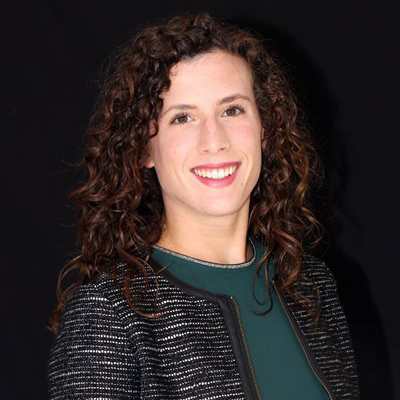
Marie Fiori (she/her/hers) received her Ph.D. in Chemistry from the University of Wisconsin-Madison. Her graduate research examined the molecular packing in organic glasses produced by physical vapor deposition, similar to the ones used as the active layers of organic light-emitting diode (OLED) devices and organic photovoltaic cells (OPVs). She became interested in the intersections of climate, energy, society, and policy when she studied sustainable development in Chiang Mai, Thailand. This interest led her to seek engagement opportunities outside of the lab, where she served in leadership positions in local and national science policy groups. Additionally, she led the Contract Enforcement Committee of her graduate workers’ union.
Marie served as a 2022-2023 Energy Jobs Fellow in the U.S. Department of Energy’s Office of Policy. As an Energy Jobs Fellow, she advanced efforts to create good jobs in the energy sector that are accessible to all workers and coordinated labor engagement at the Department. She looks forward to continuing to accelerate policies that advance clean energy and support American communities as a Congressional Fellow.
"I am eager to advance energy and environmental justice in the United States as a Congressional Fellow, and I am honored to have been selected,” said Fiori. “Climate affects all spheres of policy, and I am excited to deepen my understanding of how these policies intersect and affect American communities as a Fellow."
 Sindhu Nathan (she/her/hers) received her Ph.D. in chemical engineering from Stanford University. Her doctoral research focused on studying nanoparticle materials for sustainable fuel and chemical production. Prior to graduate school,
she received her B.S. in chemical engineering from the University of Texas at Austin.
Sindhu Nathan (she/her/hers) received her Ph.D. in chemical engineering from Stanford University. Her doctoral research focused on studying nanoparticle materials for sustainable fuel and chemical production. Prior to graduate school,
she received her B.S. in chemical engineering from the University of Texas at Austin.
While at Stanford, she has explored the intersections of science and policy through several avenues. She served as the President of the Stanford Science Policy Group and was awarded a Shultz Energy Fellow to serve at the California Energy Commission in the Office of Commissioner Patty Monahan, where she supported efforts to expand electric vehicle charging infrastructure in California. She is also a 2021 Clean Energy Leadership Institute Fellow and served on the leadership council of the National Science Policy Network. Throughout her graduate career, she has had the opportunity to publish several memos related to energy and climate issues, and she is looking forward to the opportunity to gain a new perspective on the potential roles scientists may have throughout the legislative process.
“I am so incredibly honored to have the opportunity to serve as the Optica/MRS Congressional Fellow,” said Nathan. “I have developed a passion for energy and climate policy over the past several years and look forward to the chance to learn how to leverage my engineering background towards tackling policy issues like these on the Hill over the next year."
 Rachel Starr received her PhD degree in chemistry, with a focus on applied materials chemistry, from Columbia University. She worked on a range of projects, including making, characterizing, and optimizing materials for drug/DNA delivery and single-molecule electronics. She holds a BA degree in chemistry from Barnard College.
Rachel Starr received her PhD degree in chemistry, with a focus on applied materials chemistry, from Columbia University. She worked on a range of projects, including making, characterizing, and optimizing materials for drug/DNA delivery and single-molecule electronics. She holds a BA degree in chemistry from Barnard College.
During graduate school, Starr was fortunate to gain extracurricular experience working with Columbia Technology Ventures as a technology transfer fellow, with Rhapsody Venture Partners as a sourcing consultant, and with The Climate Map as a staff researcher. She was also involved with Sci4NY, where she first learned about the interface of science and policy by scientifically addressing issues faced by the leaders of New York City. Combining all of these perspectives, she is very excited to dive deeper into policy and better understand how scientists can be involved, particularly as it relates to climate and energy issues.
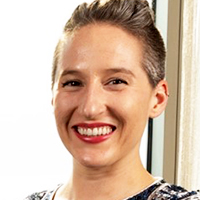 Catherine Clark received her PhD degree in materials science from the University of Minnesota. Her research is in the area of metal halide perovskite materials for optoelectronics, focusing on the development of a solvent-free deposition method to enable
the study of process-structure-property relationships in lead-free perovskite materials. Prior to graduate school, Clark worked at Siemens Energy as a mechanical engineer on wind turbines, gas turbines, and generators. She holds a BSE degree in mechanical
and aerospace engineering from Princeton University.
Catherine Clark received her PhD degree in materials science from the University of Minnesota. Her research is in the area of metal halide perovskite materials for optoelectronics, focusing on the development of a solvent-free deposition method to enable
the study of process-structure-property relationships in lead-free perovskite materials. Prior to graduate school, Clark worked at Siemens Energy as a mechanical engineer on wind turbines, gas turbines, and generators. She holds a BSE degree in mechanical
and aerospace engineering from Princeton University.
At the University of Minnesota, Clark served on several graduate student councils that work to improve graduate student life by building community, raising awareness around issues facing graduate students, and implementing policies to improve relationships between students and faculty. She has also been involved in grassroots fundraising through Headwaters Foundation’s Giving Project, which supports the work of local BIPOC (black, indigenous, people of color) organizations.
 Megan Malara earned her B.S. (2014) and Ph.D. (2020) degrees in materials science and engineering from The Ohio State University. She began her
specialization in biomaterials with research pertaining to nanoscale polymeric fibers as a platform to sort cancer cells and as a 3D scaffolding for small diameter blood vessels. Malara conducted her graduate research in tissue engineering and regenerative
medicine. Her doctoral research focused on developing the dermal-epidermal junction (DEJ) of cultured skin grafts for the treatment of large total body surface area burns. Using techniques such as photolithography and laser ablation to pattern scaffold
surfaces to mimic the native DEJ, Malara conducted in vitro analyses of cell behavior to patterning and in vivo animal studies to translate this technology towards clinical application.
Megan Malara earned her B.S. (2014) and Ph.D. (2020) degrees in materials science and engineering from The Ohio State University. She began her
specialization in biomaterials with research pertaining to nanoscale polymeric fibers as a platform to sort cancer cells and as a 3D scaffolding for small diameter blood vessels. Malara conducted her graduate research in tissue engineering and regenerative
medicine. Her doctoral research focused on developing the dermal-epidermal junction (DEJ) of cultured skin grafts for the treatment of large total body surface area burns. Using techniques such as photolithography and laser ablation to pattern scaffold
surfaces to mimic the native DEJ, Malara conducted in vitro analyses of cell behavior to patterning and in vivo animal studies to translate this technology towards clinical application.
Malara’s interest in science policy began while
attending Material Advantage Congressional Visit Days where she connected with the offices of elected officials and offered her experience as a scientist. She continued her interest in policy as a community team leader for a political campaign where
she trained and organized volunteers to engage with the public on policy-related issues. Influenced by her Rust Belt upbringing, Malara has policy interests in translating research to manufacturing jobs, increasing opportunities for education, and
improving public confidence in science.
 Daniel Broberg holds a Ph.D. degree in materials science from the University of California, Berkeley (2019). His research uses theoretical methods to investigate the formation of point defects in semiconductor materials for energy applications, with
an eye towards producing high-throughput tools for the Materials Project, a part of the Materials Genome Initiative of the U.S. National Science and Technology Council. He also holds bachelor’s degrees in physics and mathematics from the
University of Texas, Austin.
Daniel Broberg holds a Ph.D. degree in materials science from the University of California, Berkeley (2019). His research uses theoretical methods to investigate the formation of point defects in semiconductor materials for energy applications, with
an eye towards producing high-throughput tools for the Materials Project, a part of the Materials Genome Initiative of the U.S. National Science and Technology Council. He also holds bachelor’s degrees in physics and mathematics from the
University of Texas, Austin.
At UC Berkeley, he served in executive leadership roles for the Berkeley Energy & Resources Collaborative, starting an interdisciplinary mentorship program and helping direct the largest student-run energy conference on the West Coast. He also has
been active in the Science Policy Group at UC Berkeley, helping start a sub-group that writes policy memos for the California legislature.
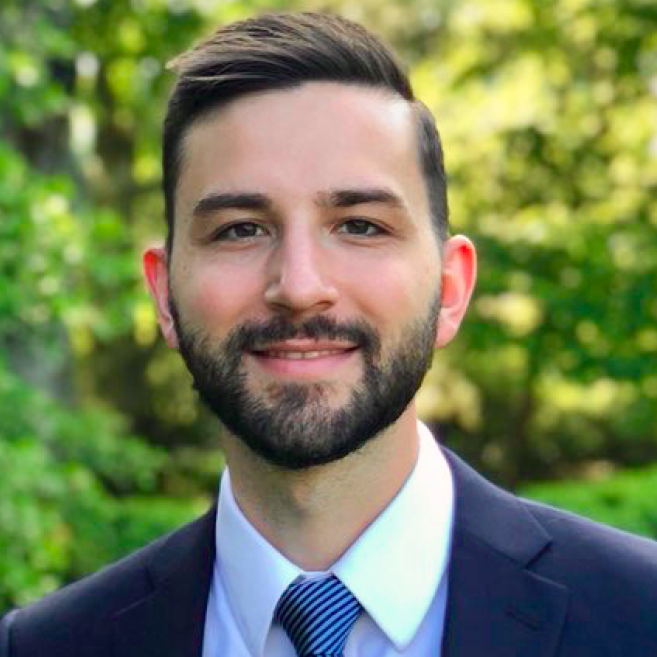 Alexander Martin earned his Ph.D. in physical chemistry from New York University (NYU) in 2018 and his B.S. in chemistry from Boston College in
2013. During his undergraduate career, he conducted atmospheric physical chemistry research related to oxidation pathways, visible light absorption, and the associated radiative forcing of organic aerosols. In his doctoral dissertation, Martin developed
polarimetric and ellipsometric measurement techniques and optical modeling methods for material characterization of optically active crystals, thin films, metamaterials, and multilayer structures. These techniques have applications in quality control
for optoelectronic devices (e.g., solar cells, LCDs, and nonlinear optics) and expand the range of materials that can be easily characterized using common polarized light instruments.
Alexander Martin earned his Ph.D. in physical chemistry from New York University (NYU) in 2018 and his B.S. in chemistry from Boston College in
2013. During his undergraduate career, he conducted atmospheric physical chemistry research related to oxidation pathways, visible light absorption, and the associated radiative forcing of organic aerosols. In his doctoral dissertation, Martin developed
polarimetric and ellipsometric measurement techniques and optical modeling methods for material characterization of optically active crystals, thin films, metamaterials, and multilayer structures. These techniques have applications in quality control
for optoelectronic devices (e.g., solar cells, LCDs, and nonlinear optics) and expand the range of materials that can be easily characterized using common polarized light instruments.
Alexander worked in Senator Schatz's office (D-HI) working
on climate policy and transportation.
 Dylan Rittman earned his PhD in geological sciences from Stanford University. His research focused on investigating the process of ionizing radiation damage over the femtosecond-to-nanosecond timescales on which it occurs. He has also worked on
nuclear waste policy through his participation in the Reset of U.S. Nuclear Waste Management Strategy and Policy series, hosted at the Center for International Security and Cooperation. He received a BSE in nuclear engineering and radiological
sciences from the University of Michigan—Ann Arbor in 2014.
Dylan Rittman earned his PhD in geological sciences from Stanford University. His research focused on investigating the process of ionizing radiation damage over the femtosecond-to-nanosecond timescales on which it occurs. He has also worked on
nuclear waste policy through his participation in the Reset of U.S. Nuclear Waste Management Strategy and Policy series, hosted at the Center for International Security and Cooperation. He received a BSE in nuclear engineering and radiological
sciences from the University of Michigan—Ann Arbor in 2014.
Dylan coordinated a contingent of Stanford University students to attend the March for Science and organized sessions to teach graduate students how to effectively perform science outreach to the public. Dylan’s previous involvement includes working at Los Alamos National Laboratory as a research intern, where he was exposed to science with diverse applications, such as alternative energy and national defense.
Dylan worked in the office of Senator Kirsten E. Gillibrand (D-New York) on the Defense and Foreign Policy portfolio.
 Inspired by material science, renewable energy and the environment, Michele Bustamante received a dual B.S. degree in materials
engineering and environmental engineering from Rensselaer Polytechnic Institute in May 2012, and her Ph.D. degree in sustainability from Rochester Institute of Technology in May 2016.
Inspired by material science, renewable energy and the environment, Michele Bustamante received a dual B.S. degree in materials
engineering and environmental engineering from Rensselaer Polytechnic Institute in May 2012, and her Ph.D. degree in sustainability from Rochester Institute of Technology in May 2016.
Michele worked in the office of Senator Ed Markey (D-Massachusetts) covering issues of energy, climate and the environment.
 Sarah Vorpahl graduated with her Ph.D. degree from the University of Washington (UW), where she studied advanced energy materials in the lab of David Ginger. Her research focused on using novel electrical scanning probe
microscopy to characterize the functional properties of next generation solar cell materials. Sarah was a National Defense Science and Engineering Graduate Fellow as well as a fellow of the Clean Energy Institute at UW where she worked across Washington
State to communicate renewable energy research to both policy makers and the public. Her doctoral work also included a Ph.D. concentration in public policy and management from the Evans School at the University of Washington, exploring topics such
as innovation and commercialization of new materials for energy. Before coming to Seattle, Sarah received a B.A. degree in modern literary studies from the University of California, Santa Cruz (2004) and a B.S. degree in chemistry from Northeastern
Illinois University (2011).
Sarah Vorpahl graduated with her Ph.D. degree from the University of Washington (UW), where she studied advanced energy materials in the lab of David Ginger. Her research focused on using novel electrical scanning probe
microscopy to characterize the functional properties of next generation solar cell materials. Sarah was a National Defense Science and Engineering Graduate Fellow as well as a fellow of the Clean Energy Institute at UW where she worked across Washington
State to communicate renewable energy research to both policy makers and the public. Her doctoral work also included a Ph.D. concentration in public policy and management from the Evans School at the University of Washington, exploring topics such
as innovation and commercialization of new materials for energy. Before coming to Seattle, Sarah received a B.A. degree in modern literary studies from the University of California, Santa Cruz (2004) and a B.S. degree in chemistry from Northeastern
Illinois University (2011).
Outside of the lab, Sarah has been dedicated to increasing representation of women and minoritized students in STEM. In her first year of graduate school she founded the student group Women in Chemical Sciences at the University of Washington to educate and empower women in STEM fields. Sarah has also spent time working with the Washington State Department of Commerce, helping to translate the technical achievements of innovative clean energy policy to a broader audience. Sarah is excited to better understand how scientists can have a meaningful impact on policy as the MRS/OSA Science and Engineering Congressional Fellow.
 Scott Litzelman earned two degrees in materials science and engineering: a B.S. degree from North Carolina
State University in 2002 and his Ph.D. degree from the Massachusetts Institute of Technology in 2009. His doctoral research focused on modulating the ionic and electronic conductivity of nanostructured thin films for solid oxide fuel cells with Dr.
Harry Tuller. During his doctoral research, Litzelman received the Charlemagne Scholarship to perform secondary ion mass spectrometry (SIMS) research for several months at the RTWH Aachen University in Germany.
Scott Litzelman earned two degrees in materials science and engineering: a B.S. degree from North Carolina
State University in 2002 and his Ph.D. degree from the Massachusetts Institute of Technology in 2009. His doctoral research focused on modulating the ionic and electronic conductivity of nanostructured thin films for solid oxide fuel cells with Dr.
Harry Tuller. During his doctoral research, Litzelman received the Charlemagne Scholarship to perform secondary ion mass spectrometry (SIMS) research for several months at the RTWH Aachen University in Germany.
After completion of his PhD, Litzelman joined Booz Allen Hamilton as a scientific consultant. For the past eight years, he has helped program directors at the Advanced Research Projects Agency-Energy (ARPA-E) and the Defense Advanced Research Projects Agency (DARPA) implement and manage early-stage R&D funding programs. He supported research programs related to fuel cells, carbon capture and storage, battery separators, energy efficiency and nanostructured materials. During his time at Booz Allen, Litzelman also explored how open innovation and crowdsourcing methods could provide new means of solving persistent technical challenges.
 Felicia Lucci earned her Ph.D. in chemistry from Tufts University, Massachusetts, where she studied surface catalyzed chemical reactions that are important to industrial catalysts and energy production. Through collaborations
with both theoretical chemists and chemical engineers, her research guided the design of a new generation of improved platinum-based catalysts with enhanced reactivity and selectivity that utilized single isolated reactive atoms in inert metallic
hosts. Lucci received her B.A. in chemistry from Franklin and Marshall College in Lancaster, Pennsylvania, where she first developed an interest in disseminating scientific results. In graduate school, her volunteer efforts emphasized empowerment
of the general public and young chemists to make educated decisions based on scientific fact. As chair of the Northeastern Section Younger Chemist Committee, she created opportunities to increase the interaction of young chemists with established
chemists locally, nationally, and internationally. She also developed classes on renewable energy and nanoscience specifically targeted to multiple audiences including elementary students, high school students and senior citizens. Though the scientific
topics of her volunteer work have been diverse, from alternative energy to science diplomacy, she has been committed to communicating impactful scientific results to the general public.
Felicia Lucci earned her Ph.D. in chemistry from Tufts University, Massachusetts, where she studied surface catalyzed chemical reactions that are important to industrial catalysts and energy production. Through collaborations
with both theoretical chemists and chemical engineers, her research guided the design of a new generation of improved platinum-based catalysts with enhanced reactivity and selectivity that utilized single isolated reactive atoms in inert metallic
hosts. Lucci received her B.A. in chemistry from Franklin and Marshall College in Lancaster, Pennsylvania, where she first developed an interest in disseminating scientific results. In graduate school, her volunteer efforts emphasized empowerment
of the general public and young chemists to make educated decisions based on scientific fact. As chair of the Northeastern Section Younger Chemist Committee, she created opportunities to increase the interaction of young chemists with established
chemists locally, nationally, and internationally. She also developed classes on renewable energy and nanoscience specifically targeted to multiple audiences including elementary students, high school students and senior citizens. Though the scientific
topics of her volunteer work have been diverse, from alternative energy to science diplomacy, she has been committed to communicating impactful scientific results to the general public.
 Aaron Dunn earned his Ph.D. degree in mechanical engineering from the Georgia Institute of Technology in Atlanta, Georgia (2016), and his B.S. and B.A. degrees in physics and mathematics, respectively, from Rice University
in Houston, Texas (2008). His doctoral research focused on the development of stochastic computational tools for efficient simulation of radiation damage accumulation in metals in the research group of Dr. Laurent Capolungo. Aaron served as the Sandia
National Laboratories/Georgia Tech Excellence in Engineering Fellow (2014-2016). Prior to that, Aaron's research was funded by the European Commission under project RADINTERFACES, leading to three years of study at Georgia Tech Lorraine in Metz, France.
Aaron Dunn earned his Ph.D. degree in mechanical engineering from the Georgia Institute of Technology in Atlanta, Georgia (2016), and his B.S. and B.A. degrees in physics and mathematics, respectively, from Rice University
in Houston, Texas (2008). His doctoral research focused on the development of stochastic computational tools for efficient simulation of radiation damage accumulation in metals in the research group of Dr. Laurent Capolungo. Aaron served as the Sandia
National Laboratories/Georgia Tech Excellence in Engineering Fellow (2014-2016). Prior to that, Aaron's research was funded by the European Commission under project RADINTERFACES, leading to three years of study at Georgia Tech Lorraine in Metz, France.
Aaron's policy interests are influenced by his unique combination of experiences and range from STEM education to energy and climate policy. Additionally, he is excited for the opportunity to learn about and contribute positively to the legislative process in all areas of policy: "I think of the MRS/TMS Congressional Science and Engineering Fellowship as the opportunity of a lifetime. I am thrilled to have the opportunity to contribute to the legislative process, and I think my unique background and varied experiences will help me to make a positive impact on science and education policy."
 Peter W. Winter received a Ph.D. degree in cell and molecular biology in 2011 from Colorado State University and earned his B.A.
degree in chemistry from Colorado College in 2005. From 2011-2015, Winter trained as a National Institutes of Health IRTA postdoctoral fellow in the National Institute of Biomedical Imaging and Bioengineering’s Section on High Resolution Optical
Imaging, where he developed novel fluorescence imaging tools for application in biological and clinical research. Winter’s research has led to the publication of over a dozen peer-reviewed scientific papers, a book chapter, and invitations to
present at conferences and universities around the world.
Peter W. Winter received a Ph.D. degree in cell and molecular biology in 2011 from Colorado State University and earned his B.A.
degree in chemistry from Colorado College in 2005. From 2011-2015, Winter trained as a National Institutes of Health IRTA postdoctoral fellow in the National Institute of Biomedical Imaging and Bioengineering’s Section on High Resolution Optical
Imaging, where he developed novel fluorescence imaging tools for application in biological and clinical research. Winter’s research has led to the publication of over a dozen peer-reviewed scientific papers, a book chapter, and invitations to
present at conferences and universities around the world.
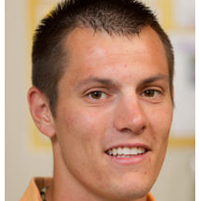 Jeremy W. Ward received his B.A. degree in physics and mathematics in 2006 from Simpson College and
went on to earn his Ph.D. degree in physics in 2015 from Wake Forest University. His doctoral research interests included investigations on the self-patterning fabrication and electrical properties of solution-processed organic field-effect transistors
within the Organic Electronics Research Group led by Oana D. Jurchescu. Ward was a 2013 Wake Forest University Richter Scholar, serving as a visiting researcher at the Institute of Materials Science of Barcelona (ICMAB). He became a National Science
Foundation Graduate Research Fellow (NSF-GRFP) in 2012, and is currently serving in that position.
Jeremy W. Ward received his B.A. degree in physics and mathematics in 2006 from Simpson College and
went on to earn his Ph.D. degree in physics in 2015 from Wake Forest University. His doctoral research interests included investigations on the self-patterning fabrication and electrical properties of solution-processed organic field-effect transistors
within the Organic Electronics Research Group led by Oana D. Jurchescu. Ward was a 2013 Wake Forest University Richter Scholar, serving as a visiting researcher at the Institute of Materials Science of Barcelona (ICMAB). He became a National Science
Foundation Graduate Research Fellow (NSF-GRFP) in 2012, and is currently serving in that position.
Ward draws from his passion of working with people, specifically those interested in learning and working together in creative and productive ways. He will provide a unique perspective to a Congressional office by drawing from his experiences in the United States military, as a youth soccer coach, as a PhD scholar within the materials science community, and through his strong ties to the secondary education community. While Ward's future policy interests include STEM education, ranging from early childhood to post-secondary stages, he is looking forward to learning about the interdisciplinary nature of using federal policy to address the science and education-related problems of today.
 Jimmy O'Dea earned his Ph.D. degree in chemistry from the University of California, Santa Barbara, where, with Professor Steve Buratto,
he directly imaged proton conducting pathways in polymer membranes under device-relevant conditions for the first time; proton conducting membranes are a critically important component of fuel cells. Following his Ph.D., O'Dea was a postdoctoral fellow
working with John Marohn in the Energy Materials Center at Cornell. At Cornell, O'Dea investigated metal-nitride films to replace the corrosion-prone carbon layer used in fuel cells to support the catalyst. O'Dea received a bachelor's degree in chemistry
from the University of Puget Sound.
Jimmy O'Dea earned his Ph.D. degree in chemistry from the University of California, Santa Barbara, where, with Professor Steve Buratto,
he directly imaged proton conducting pathways in polymer membranes under device-relevant conditions for the first time; proton conducting membranes are a critically important component of fuel cells. Following his Ph.D., O'Dea was a postdoctoral fellow
working with John Marohn in the Energy Materials Center at Cornell. At Cornell, O'Dea investigated metal-nitride films to replace the corrosion-prone carbon layer used in fuel cells to support the catalyst. O'Dea received a bachelor's degree in chemistry
from the University of Puget Sound.
At Cornell, O'Dea played leading roles in efforts for the university to divest its endowment from holdings in fossil fuel companies and to adopt an open-access publishing policy. He also served on the editorial board of a research newsletter published by the Department of Energy and organized an energy-related seminar series for graduate students and postdocs. In graduate school, O'Dea interned for a scientific-instrument startup company, independently taught a freshman chemistry course and designed curriculum with junior high science teachers. O'Dea is interested in public policy at the intersection of energy and health.
O'Dea was the 2014-2015 MRS/OSA Congressional Science and Engineering Fellow in the office of Senator Brian Schatz (HI) working on climate and energy policy.
 Adria Wilson earned her Ph.D. degree in chemistry (2014) from Duke University in Durham,
North Carolina, and her B.S. degree in chemistry (2009) from Drexel University in Philadelphia, Pennsylvania. Her thesis work was focused on synthesizing and characterizing bimetallic nanoparticle catalysts with well-controlled structures for investigating
the influence of the nanoparticle structure on its performance as a catalyst.
Adria Wilson earned her Ph.D. degree in chemistry (2014) from Duke University in Durham,
North Carolina, and her B.S. degree in chemistry (2009) from Drexel University in Philadelphia, Pennsylvania. Her thesis work was focused on synthesizing and characterizing bimetallic nanoparticle catalysts with well-controlled structures for investigating
the influence of the nanoparticle structure on its performance as a catalyst.
Wilson worked in the office of Senator Bernie Sanders (VT) working on energy and the environment.
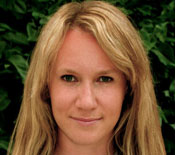 Sydney Kaufman earned a Ph.D. degree in chemical physics at the University of Colorado Boulder in 2013 using photodissociation spectroscopy
to study anionic transition metal complexes. While in graduate school, Kaufman was a contributing editor to the online publications Novus Light Today and Solar Novus Today focusing on solar energy policy and photonics. She was also a co-director of
the CU chapter of the Forum on Science Ethics and Policy (FOSEP), an organization that works to promote dialogue between scientists, policy makers and the public. Prior to graduate school, Kaufman was an AmeriCorps VISTA volunteer based out of Anchorage,
Alaska, working on issues associated with rural energy. She holds a B.S. in chemistry from McGill University.
Sydney Kaufman earned a Ph.D. degree in chemical physics at the University of Colorado Boulder in 2013 using photodissociation spectroscopy
to study anionic transition metal complexes. While in graduate school, Kaufman was a contributing editor to the online publications Novus Light Today and Solar Novus Today focusing on solar energy policy and photonics. She was also a co-director of
the CU chapter of the Forum on Science Ethics and Policy (FOSEP), an organization that works to promote dialogue between scientists, policy makers and the public. Prior to graduate school, Kaufman was an AmeriCorps VISTA volunteer based out of Anchorage,
Alaska, working on issues associated with rural energy. She holds a B.S. in chemistry from McGill University.
Kaufman's policy interests include renewable and conventional energy policy; energy storage and smart grid technologies; small business development; science education; environmental conservation and natural resource management (e.g. water rights, fisheries, mining, oil and natural gas); foreign relations and international development.
Kaufman was the 2013-2014 MRS/OSA Congressional Science and Engineering Fellow in the office of Senator Mark Begich of Alaska focusing primarily on energy and natural resources. In particular, Kaufman’s issue areas included renewable energy and energy efficiency, energy infrastructure development, transportation fuels, mining and the Arctic.
 Megan Brewster earned her Ph.D. degree in materials science and engineering from Massachusetts Institute of Technology (2011)
and B.S. degree in material science and engineering from the University of Washington (2006).
Megan Brewster earned her Ph.D. degree in materials science and engineering from Massachusetts Institute of Technology (2011)
and B.S. degree in material science and engineering from the University of Washington (2006).
After receiving her Ph.D. in 2011, Brewster moved to GE Global Research in Schenectady, New York, where her broad and deep scientific expertise supported the Durathon battery start-up by developing next-generation technologies.
Brewster spent her fellowship year with the majority staff of the Senate Committee on Energy and Natural Resources. She focused on issues related to energy, including: renewable energy, energy efficiency, the energy-water nexus, critical minerals, advanced manufacturing, funding for energy-related research and energy-related tax policy. On these topics, she convened stakeholders, developed legislation, briefed Chairman Ron Wyden, drafted communications and speeches, and attended committee hearings and business meetings.
 As the MRS/OSA Fellow, Mirvat Abdelhaq worked in the office of Senator Jeff Merkley (D-Ore.), providing guidance on science policy
issues involving energy and the environment.
As the MRS/OSA Fellow, Mirvat Abdelhaq worked in the office of Senator Jeff Merkley (D-Ore.), providing guidance on science policy
issues involving energy and the environment.
Abdelhaq earned her Ph.D. degree in physical chemistry from the University of Colorado, Boulder, in 2012. Her research involved synthesizing and characterizing novel transition metal complexes with renewable energy applications. In 2006, she graduated from the University of New Mexico where she earned a B.S. degree in chemistry and a B.A. degree in history.
At Boulder, Abdelhaq served as the co-director of the Forum on Science, Ethics and Policy (FOSEP), volunteered as a mentor with the Boulder County Community Services Mentoring Program, was a member of Energy SWEEP—a program that distributes and installs energy efficient materials to low-income households and tutored female Sudanese refugees. At the University of New Mexico, she worked as a chemistry and Arabic tutor and was certified as a master tutor by the College Reading and Learning Association.
 As the MRS/TMS Fellow, Andrew Steigerwald worked in the personal office of Senator Sherrod Brown (D-Ohio)
with the legislative staff on energy, manufacturing, and tax policy, helping to develop ideas and strategies to implement different policies in Congress. This included developing responsible energy and environmental policies in areas dealing with
shale gas production, R&D tax credit policies to encourage innovation and investment, and reform of manufacturing tax policy to encourage economic growth and expansion in the advanced manufacturing sector.
As the MRS/TMS Fellow, Andrew Steigerwald worked in the personal office of Senator Sherrod Brown (D-Ohio)
with the legislative staff on energy, manufacturing, and tax policy, helping to develop ideas and strategies to implement different policies in Congress. This included developing responsible energy and environmental policies in areas dealing with
shale gas production, R&D tax credit policies to encourage innovation and investment, and reform of manufacturing tax policy to encourage economic growth and expansion in the advanced manufacturing sector.
Steigerwald earned his B.E. degree (2005) from Ohio State University, M.S. degree (2007) from Fisk University and Ph.D. degree (2010) in interdisciplinary materials science and engineering from Vanderbilt University as an National Science Foundation (NSF) Integrative Graduate Education and Research Traineeship (IGERT) Fellow. His thesis work focused on the development of photoacoustic spectroscopy as a technique for characterizing radiation damage in semiconductors. While working on his Ph.D., Steigerwald worked extensively on novel thin-film growth techniques, studied ultrafast dynamics of diluted magnetic semiconducting systems for use in potential spintronic devices, and spent time as a visiting scientist at Lawrence Livermore National Laboratory. Following his Ph.D., Steigerwald continued as a post-doctoral researcher at Vanderbilt, working to understand the nanoscale relationship between structural disorder and opt oelectronic modification in optical devices.
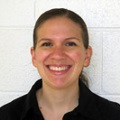 Laura Povlich earned her Ph.D. degree in macromolecular science and engineering at the University of Michigan, Ann Arbor, in 2011
as a Rackham Merit Fellow and an NIDCR Tissue Engineering and Regeneration Training Grant recipient. Her thesis work involved the development of new conducting polymers to interface neural prosthetic devices with nervous tissue.
Laura Povlich earned her Ph.D. degree in macromolecular science and engineering at the University of Michigan, Ann Arbor, in 2011
as a Rackham Merit Fellow and an NIDCR Tissue Engineering and Regeneration Training Grant recipient. Her thesis work involved the development of new conducting polymers to interface neural prosthetic devices with nervous tissue.
In 2009, Povlich moved to the University of Delaware and finished her Ph.D. research as a visiting scholar. In 2006, Povlich received her B.S.E. degree in materials science and engineering from the University of Michigan, where she first began her research career as a freshman through the Undergraduate Research Opportunity Program.
Povlich’s interest in science policy began in graduate school at Michigan and while researching in Delaware. While attending the Science Outside the Lab program through the Consortium for Science, Policy and Outcomes at Arizona State University, Povlich was able to learn about the wide variety of organizations involved in forming and implementing science policies, solidifying her desire to pursue a policy career. Povlich’s interests in policy include education, healthcare, science and the funding of developing technologies.
 Jennifer Nekuda Malik earned her Ph.D. (2008), M.S. (2006) and B.S. (2005) degrees in metallurgy
and materials engineering from Colorado School of Mines (CSM). Her thesis work was a collaborative project between CSM and the National Renewable Energy Laboratory (NREL) that focused on development and optimization of deposition and processing conditions
for liquid-based precursors for copper-indium-gallium-diselenide (CIGS) photovoltaics. While working on her Ph.D. degree, Malik earned both an R&D 100 Award and recognition for Excellence in Technology Transfer for her work with hybrid CIGS. Following
her Ph.D., Malik worked as a post-doctoral researcher at Imperial College London, characterizing and optimizing the microstructure of both hybrid (organic-inorganic) and organic materials for electronic applications.
Jennifer Nekuda Malik earned her Ph.D. (2008), M.S. (2006) and B.S. (2005) degrees in metallurgy
and materials engineering from Colorado School of Mines (CSM). Her thesis work was a collaborative project between CSM and the National Renewable Energy Laboratory (NREL) that focused on development and optimization of deposition and processing conditions
for liquid-based precursors for copper-indium-gallium-diselenide (CIGS) photovoltaics. While working on her Ph.D. degree, Malik earned both an R&D 100 Award and recognition for Excellence in Technology Transfer for her work with hybrid CIGS. Following
her Ph.D., Malik worked as a post-doctoral researcher at Imperial College London, characterizing and optimizing the microstructure of both hybrid (organic-inorganic) and organic materials for electronic applications.
 Ashley White earned her Ph.D. degree in materials science from the University of Cambridge in 2010 as a British Marshall Scholar
and NSF Graduate Research Fellow. Her thesis work focused on developing carbon nanotube-reinforced hydroxyapatite bone graft materials with improved mechanical properties. Following her Ph.D., White did post-doc work at Cambridge on the removal of
carbon nanotubes from body tissue using laser irradiation. While at Cambridge, White was heavily involved in teaching, serving as co-director of the Science and Engineering Experiments for Kids program, instructing undergraduates, and developing laboratory
courses. Additionally, she served on administrative committees, both in the department of materials and elsewhere in the university.
Ashley White earned her Ph.D. degree in materials science from the University of Cambridge in 2010 as a British Marshall Scholar
and NSF Graduate Research Fellow. Her thesis work focused on developing carbon nanotube-reinforced hydroxyapatite bone graft materials with improved mechanical properties. Following her Ph.D., White did post-doc work at Cambridge on the removal of
carbon nanotubes from body tissue using laser irradiation. While at Cambridge, White was heavily involved in teaching, serving as co-director of the Science and Engineering Experiments for Kids program, instructing undergraduates, and developing laboratory
courses. Additionally, she served on administrative committees, both in the department of materials and elsewhere in the university.
In 2005, White received her B.S. degree in materials science and engineering from Virginia Tech, along with a B.A. degree in music performance. As an undergraduate, she gained research experience through several research experience for undergraduate programs, DOE internships, work abroad and at Virginia Tech. An accomplished violinist, she has served as president of the Cambridge Graduate Orchestra, performed with various orchestras and chamber groups and spent time in Paraguay and Mexico doing research and teaching related to youth orchestras.
View this video of Ashley White discussing her experience as a Congressional Fellow.
 Gavi Begtrup earned his Ph.D. degree in physics from the University of California, Berkeley, in December 2008 and his B.S. from Western
Kentucky University in May 2002. His Ph.D. dissertation was entitled "Silicon Nitride Membranes for Electrical and Thermal Transport Studies of Nanotubes," and his graduate research spanned the breadth of nanotechnology research, from synthesis and
characterization to micofabrication and analysis of devices. By developing a novel silicon nitride platform, he was able to observe with atomic precision the evolution of nanotube devices during their operation, resulting in the study of the high-temperature
(3000K) local properties of carbon nanotubes as well as the creation of a new type of nanoscale memory element. His discoveries have applications in electronics heat management and future data storage.
Gavi Begtrup earned his Ph.D. degree in physics from the University of California, Berkeley, in December 2008 and his B.S. from Western
Kentucky University in May 2002. His Ph.D. dissertation was entitled "Silicon Nitride Membranes for Electrical and Thermal Transport Studies of Nanotubes," and his graduate research spanned the breadth of nanotechnology research, from synthesis and
characterization to micofabrication and analysis of devices. By developing a novel silicon nitride platform, he was able to observe with atomic precision the evolution of nanotube devices during their operation, resulting in the study of the high-temperature
(3000K) local properties of carbon nanotubes as well as the creation of a new type of nanoscale memory element. His discoveries have applications in electronics heat management and future data storage.
Begtrup's growing interest in policy led to his involvement in student politics on both a local and national level. During graduate school, he served as the vice-president of external affairs for the UC Berkeley Graduate Assembly as well as the chair of the American Physical Society Forum on Graduate Student Affairs. After completing his Ph.D., he spent the fall of 2008 as a Christine Mirzayan Science and Technology Policy Graduate Fellow at the National Academies of Science. He worked with the Committee on Science, Engineering and Public Policy on a project related to the efficacy and utility of large-scale science projects, such as the proposed Manhattan Project for Energy.
Begtrup was assigned to the office of Congresswoman Gabrielle Giffords (D-Ariz.).
 Edward D. Herderick received his Ph.D. degree in materials science and engineering from The Ohio State
University in August 2009. He received his B.S. (2005) and M.S. (2007) degrees in MSE from Ohio State as well. His graduate research has been done under the advisement of Prof. Nitin Padture and is focused on the synthesis, characterization and property
measurement of metal-oxide-metal heterojunction nanowires. During his graduate studies, Ed was an NSF IGERT fellow (2005-2008) and received a Diamond Award from the American Ceramic Society (2008). In addition to his academic work, Ed has been an
active member of the campus community, serving on the OSU council of graduate students for two years and also taking part in many outreach activities to bring students and teachers to campus. His main area of policy interest is in solutions to the
21stcentury energy challenge; that is improving the way we generate, transmit and consume energy to provide economic growth and strengthen national security in an environmentally sustainable manner.
Edward D. Herderick received his Ph.D. degree in materials science and engineering from The Ohio State
University in August 2009. He received his B.S. (2005) and M.S. (2007) degrees in MSE from Ohio State as well. His graduate research has been done under the advisement of Prof. Nitin Padture and is focused on the synthesis, characterization and property
measurement of metal-oxide-metal heterojunction nanowires. During his graduate studies, Ed was an NSF IGERT fellow (2005-2008) and received a Diamond Award from the American Ceramic Society (2008). In addition to his academic work, Ed has been an
active member of the campus community, serving on the OSU council of graduate students for two years and also taking part in many outreach activities to bring students and teachers to campus. His main area of policy interest is in solutions to the
21stcentury energy challenge; that is improving the way we generate, transmit and consume energy to provide economic growth and strengthen national security in an environmentally sustainable manner.
Herderick was assigned to the office of Senator Sherrod Brown (D-OH).
 Amit Mistry completed his doctorate in bioengineering from Rice University in April 2007. His dissertation, entitled "Degradation
and biocompatibility of a fumarate-based/alumoxane nanocomposite for bone tissue engineering," afforded him the opportunity to study nanotechnology, biomaterials, and regenerative medicine.
Amit Mistry completed his doctorate in bioengineering from Rice University in April 2007. His dissertation, entitled "Degradation
and biocompatibility of a fumarate-based/alumoxane nanocomposite for bone tissue engineering," afforded him the opportunity to study nanotechnology, biomaterials, and regenerative medicine.
Mistry has been a science policy intern and fellow at Research!America, a not-for-profit group that advocates for health research. Mistry was also a Christine Mirzayan Science and Technology Policy Fellow at the National Academy of Engineering where he worked on a resource for engineering educators. In addition, Mistry served as a high school science and math teacher for two years with Teach for America.
Amit Mistry accepted a position in the office of Congressman Ed Markey (D-Mass.)
 Ticora V. Jones earned her Ph.D. degree in polymer science & engineering from the University of
Massachusetts at Amherst in 2006 and her B.S. degree in materials science and engineering from the Massachusetts Institute of Technology in 2000. Jones was both a NIH fellowship recipient and a Ford Foundation Pre-doctoral Fellow during her graduate
career.
Ticora V. Jones earned her Ph.D. degree in polymer science & engineering from the University of
Massachusetts at Amherst in 2006 and her B.S. degree in materials science and engineering from the Massachusetts Institute of Technology in 2000. Jones was both a NIH fellowship recipient and a Ford Foundation Pre-doctoral Fellow during her graduate
career.
Upon completing her doctorate, Jones worked as a postdoctoral researcher at Lawrence Livermore National Laboratory where her research was focused on creating and characterizing metal nanoparticles for catalysis applications and merging them with polymer nanocomposites to create functional materials.
Jones accepted a position in Senator Russell Feingold's (D-WI) office.
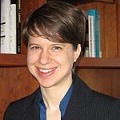 Alicia Jackson earned her Ph.D. degree in materials science and engineering from the Massachusetts Institute of Technology in June
2007. Her dissertation is on "Phase Separation and Nanostructuring in the Ligand Shell of Nanoparticles." During her thesis research, she discovered that mixtures of molecules, when assembled on nanoparticles, show ordered phase-separation at a molecular
length scale, resulting in several novel and unexpected properties. This discovery has a number of interesting biotechnological applications, as well as having wide reaching implications for the environmental health and safety implications of nanoparticles.
Alicia Jackson earned her Ph.D. degree in materials science and engineering from the Massachusetts Institute of Technology in June
2007. Her dissertation is on "Phase Separation and Nanostructuring in the Ligand Shell of Nanoparticles." During her thesis research, she discovered that mixtures of molecules, when assembled on nanoparticles, show ordered phase-separation at a molecular
length scale, resulting in several novel and unexpected properties. This discovery has a number of interesting biotechnological applications, as well as having wide reaching implications for the environmental health and safety implications of nanoparticles.
After completing her Ph.D., Jackson will spend the summer at the National Academies of Science as a Christine Mirzyan Science and Technology Policy Graduate Fellow. While there, she will work with the Committee on Science, Engineering and Public Policy on the project of Ensuring the Utility and Integrity of Research Data in a Digital Era.
During her time as the MRS/OSA Congressional Fellow, Jackson looks forward to developing policies that will encourage the critical scientific developments and technology transfers necessary to solve the many environmental, health and defense challenges facing us today and that encourage the link between technological and economic development and contribute to human progress. Jackson will be working in the Senate Energy and Natural Resource Office during her fellowship.
 Kevin Whittlesey earned his Ph.D. degree in biological sciences from Northwestern University in 2005. His dissertation research in
neural tissue engineering developed a biomaterials-based strategy to treat spinal cord injury. Prior to his graduate work, Whittlesey spent three years working for the National Institute of Allergy and Infectious Diseases, first as a pre-doctoral
fellow and subsequently as a staff biologist.
Kevin Whittlesey earned his Ph.D. degree in biological sciences from Northwestern University in 2005. His dissertation research in
neural tissue engineering developed a biomaterials-based strategy to treat spinal cord injury. Prior to his graduate work, Whittlesey spent three years working for the National Institute of Allergy and Infectious Diseases, first as a pre-doctoral
fellow and subsequently as a staff biologist.
Upon completing his doctorate, Whittlesey was introduced to science policy at the National Academies as a Christine Mirzayan Science and Technology Policy Graduate Fellow with the Committee on Science, Technology, and Law. Whittlesey then served as a post-doctoral fellow with Aastrom Biosciences, where he worked with the Stem Cell Biology Group to examine the potential for adult human bone marrow-derived stem cells to regenerate bone and neural tissue for clinical applications.
Whittlesey has a deep interest in science education. He has been involved in numerous education and outreach programs since early in his undergraduate career. Whittlesey looks forward to the unique opportunity that the Congressional Fellowship presents and applying the experience to pursue a career in science education policy.
 Benjamin Jay Gross earned his Ph.D. degree in physical chemistry at Columbia University and his B.S. degree in chemistry at the University
of California, Berkeley. His thesis research examined the development of solid-state nuclear magnetic resonance spectroscopy methods for application in structural biology. Prior to his thesis work, he spent two years studying molecular electronic
materials by single molecule spectroscopy and ultra-microscopy techniques. He spent a year and a half teaching physical chemistry to senior level undergraduates and was a member of the Columbia Chemistry Careers Committee, which brings in chemistry
Ph.D.s to speak of their careers outside of academic research.
Benjamin Jay Gross earned his Ph.D. degree in physical chemistry at Columbia University and his B.S. degree in chemistry at the University
of California, Berkeley. His thesis research examined the development of solid-state nuclear magnetic resonance spectroscopy methods for application in structural biology. Prior to his thesis work, he spent two years studying molecular electronic
materials by single molecule spectroscopy and ultra-microscopy techniques. He spent a year and a half teaching physical chemistry to senior level undergraduates and was a member of the Columbia Chemistry Careers Committee, which brings in chemistry
Ph.D.s to speak of their careers outside of academic research.
After earning his Ph.D. degree, he spent the fall of 2004 at the National Academies as a Christine Mirzayan Science and Technology Policy Graduate Fellow. While there, he worked with the Division on Engineering and Physical Sciences on the review of the National Nanotechnology Initiative. It was during this fellowship that he became certain he wished to pursue a career in science policy.
Gross looks forward to his time as the MRS/OSA Congressional Fellow and to the opportunity to participate in the process that informs the creation and implementation of science and technology policy.
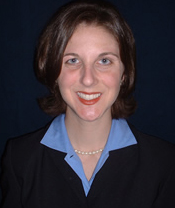 Karin Ezbiansky Pavese earned her Ph.D. degree in inorganic chemistry from the University of Pennsylvania in 2000. Upon completion
of her degree, she took a position in the General Electric Company's two-year Technical Leadership Program where she lead technical programs and, in parallel, completed management training. For the past two years, Pavese has been a product developer
and six sigma Black Belt in the area of nano-particle filled coatings where her focus has most recently been in the optical media field. Pavese is an author of six publications, three patents, three patent disclosures, four GE proprietary technical
reports and nine conference presentations.
Karin Ezbiansky Pavese earned her Ph.D. degree in inorganic chemistry from the University of Pennsylvania in 2000. Upon completion
of her degree, she took a position in the General Electric Company's two-year Technical Leadership Program where she lead technical programs and, in parallel, completed management training. For the past two years, Pavese has been a product developer
and six sigma Black Belt in the area of nano-particle filled coatings where her focus has most recently been in the optical media field. Pavese is an author of six publications, three patents, three patent disclosures, four GE proprietary technical
reports and nine conference presentations.
Pavese looks forward to her role as the MRS/OSA Congressional Fellow as an opportunity to combine her technical competency with her deep passion for service to the community.
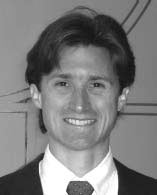 Colin McCormick was been named the MRS/OSA Congressional Science and Engineering Fellow for 2003-2004, with his term beginning in
September.
Colin McCormick was been named the MRS/OSA Congressional Science and Engineering Fellow for 2003-2004, with his term beginning in
September.
"During my research career in atomic physics and nonlinear optics, I have become aware of the important links between public policy and science," McCormick said. Policymakers often guide what scientific areas will be explored, pressing researchers to answer questions of immediate importance, ”at least in the view of the policymaker in question. Yet at other times, science leads policy by developing faster than debate and decision can follow. Legislators then must determine after the fact how these advances will impact society as a whole. I am interested in both of these modes of science policy."
While obtaining his M.A. and Ph.D. degrees in physics at the University of California, Berkeley, McCormick taught physics to undergraduate students who typically had not already been exposed to the field. This experience, along with his tenure as editor in chief of the student-run Berkeley Science Review, a journal promoting public understanding of graduate research, prepared McCormick to explain scientific topics to a nontechnical audience. He was eager to apply this skill to the legislative process.
As a recipient of this one-year appointment, sponsored jointly by the Materials Research Society and the Optical Society of America, McCormick took a position in the office of Rep. Edward J. Markey (D-Mass.).
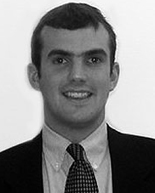 Jeffrey H. Haeni is the 2002-2003 OSA/MRS Congressional Science and Engineering Fellow.
Jeffrey H. Haeni is the 2002-2003 OSA/MRS Congressional Science and Engineering Fellow.
Haeni received his Ph.D. degree in materials science in August 2002 from The Pennsylvania State University. His research interests involve the investigation and growth of high-epitaxial gate dielectrics and other perovskite materials on silicon.
He has held several fellowships and was named Semiconductor Research Corporation Graduate Fellow (2001-2003). He has published three lead-author articles in refereed journals and was an invited co-author of an article in the March 2002 issue of MRS Bulletin.
As a recipient of this one-year appointment, sponsored jointly by the Optical Society of America and the Materials Research Society, Haeni worked in the office of Rep. Rush Holt (D-N.J.) as a consultant on scientific and technical matters.
 Eric Werwa, an assistant professor in the department of physics and astronomy at Otterbein College in Westerville, Ohio, was named
the 2001-2002 MRS/OSA Congressional Science and Engineering Fellow.
Eric Werwa, an assistant professor in the department of physics and astronomy at Otterbein College in Westerville, Ohio, was named
the 2001-2002 MRS/OSA Congressional Science and Engineering Fellow.
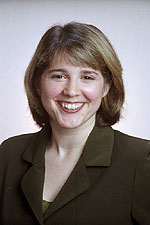 Susan Ginsberg was appointed the 2000-2001 OSA/MRS Congressional Science and Engineering Fellow. At the time of her appointment,
Ginsberg was a graduate research and teaching assistant at the University of Minnesota in the department of geology and geophysics and the department of chemical engineering and materials science. She received her B.A. degree in geology from Amherst,
M.S. degree in geophysics, and Ph.D. degree in materials science engineering from the University of Minnesota. Ginsberg, an MRS member, is also a member of the American Ceramic Society, American Geophysical Union, Association for Women Geoscientists
and the Geological Society of America. She served as a legislative intern for Representative Betty Folliard, Minnesota State House of Representatives, and had previously served as a research assistant in the department of chemical engineering at The
Technion (Haifa, Israel) and as a research scientist in the department of mineral sciences at the American Museum of Natural History in New York.
Susan Ginsberg was appointed the 2000-2001 OSA/MRS Congressional Science and Engineering Fellow. At the time of her appointment,
Ginsberg was a graduate research and teaching assistant at the University of Minnesota in the department of geology and geophysics and the department of chemical engineering and materials science. She received her B.A. degree in geology from Amherst,
M.S. degree in geophysics, and Ph.D. degree in materials science engineering from the University of Minnesota. Ginsberg, an MRS member, is also a member of the American Ceramic Society, American Geophysical Union, Association for Women Geoscientists
and the Geological Society of America. She served as a legislative intern for Representative Betty Folliard, Minnesota State House of Representatives, and had previously served as a research assistant in the department of chemical engineering at The
Technion (Haifa, Israel) and as a research scientist in the department of mineral sciences at the American Museum of Natural History in New York.
As the OSA/MRS Fellow, Ginsberg worked as a special legislative assistant on the staff of Rep. Howard L. Berman (D-Calif.).
.jpg?sfvrsn=bc12e811_0) Arun Seraphin, research staff member in the science and technology division at the Institute for Defense Analyses (IDA), has been
named the 1999-2000 Materials Research Society/Optical Society of America Congressional Science and Engineering Fellow.
Arun Seraphin, research staff member in the science and technology division at the Institute for Defense Analyses (IDA), has been
named the 1999-2000 Materials Research Society/Optical Society of America Congressional Science and Engineering Fellow.
With a doctoral degree from the department of materials science and engineering from the Massachusetts Institute of Technology, a B.A. degree in political science from the State University of New York—Stony Brook and three years' experience working for IDA, Seraphin views this fellowship as a natural step in his pursuit of a career in science and technology policy.
As a recipient of this one-year appointment sponsored jointly by MRS and OSA, Seraphin worked directly for Sen. Joseph Lieberman (D-Conn.) as a consultant on scientific and technical matters.
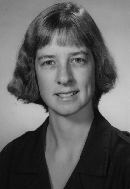 Merrilea J. Mayo, associate professor of materials science and engineering at The Pennsylvania State University, has been named the
1998-1999 OSA/MRS Congressional Science and Engineering Fellow.
Merrilea J. Mayo, associate professor of materials science and engineering at The Pennsylvania State University, has been named the
1998-1999 OSA/MRS Congressional Science and Engineering Fellow.
After receiving her Ph.D. degree in materials science and engineering in 1988 from Stanford University, Mayo worked at Sandia, then later at Penn State. Her current research focuses on developing fully dense bulk ceramics with sub-100-nm grain sizes by
sinter-forging, pressureless sintering, and alternate densification routes, using a combination of experimental work and analytical modeling of the sintering/deformation processes. She has received a Fellowship from the Japan Society for the Promotion
of Science (1993) and from the Exxon Foundation (1982-1984) and the NSF Presidential Young Investigator Award (1991-1996). She has over 50 authored and co-authored publications.
As a recipient of this one-year appointment sponsored jointly by the Optical Society of America and the Materials Research Society, Mayo will spend her sabbatical from Penn State working directly at the office of Sen. Joseph Lieberman (D-Conn.),
as a consultant on scientific and technical matters.
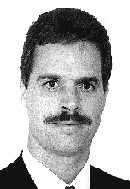 Brian Holloway of Stanford University was the recipient of the 1997-98 MRS/OSA Congressional Science and Engineering Fellowship.
Brian Holloway of Stanford University was the recipient of the 1997-98 MRS/OSA Congressional Science and Engineering Fellowship.As a precursor to a career involving public service and technology transfer, he worked for one year in a Washington congressional office. Holloway's dissertation work involved studying the chemical bonding present in carbon nitride thin films in order to determine the chemical processes occurring during film deposition. He received a B.S. degree in mechanical engineering from the University of Florida. During his undergraduate years, Holloway co-owned and operated a commercial fishing company.
Holloway will work with Sen. John D. Rockefeller (D-W.Va.).
 Michal I. Freedhoff was the 1996-97 OSA/MRS Congressional Science and Engineering Fellow.
Michal I. Freedhoff was the 1996-97 OSA/MRS Congressional Science and Engineering Fellow.A chemistry graduate of McGill University (Montreal, Canada), Freedhoff received her M.S. and Ph.D. degrees in physical chemistry from the University of Rochester (Rochester, New York). Her doctoral thesis work with Princeton University professor George McLendon on quantum confinement effects in semiconductor nanocrystals has attracted international attention. Performed at Eastman Kodak Company, this research has resulted in several invited articles and a NATO tutorship.
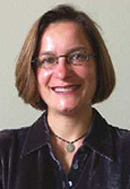 Kelly S. Kirkpatrick was the 1995-1996 MRS/OSA Congressional Science and Engineering Fellow. Kirkpatrick, a graduate student at Northwestern
University, was the first recipient of this new fellowship.
Kelly S. Kirkpatrick was the 1995-1996 MRS/OSA Congressional Science and Engineering Fellow. Kirkpatrick, a graduate student at Northwestern
University, was the first recipient of this new fellowship.Kirkpatrick, a chemistry and business graduate of the University of Richmond, completed her Ph.D. degree in materials science and engineering at Northwestern University. Her Ph.D. thesis research was performed at Argonne National Laboratory under the facility's Lab-Grad Fellowship program. She also did research under a Department of Energy Female and Minority Fellowship. Kirkpatrick's research interests center around ceramic processing as well as electrical and microstructural characterization of electroceramics, and includes studies in impedance spectroscopy of zinc oxide varistors. She has published articles in the Journal of the American Ceramic Society and has presented papers at professional societies and symposia. Kirkpatrick was an MRS Graduate Student Award Finalist in 1992.
Kirkpatrick will work in the office of Sen. Joseph Lieberman (D-Conn.).
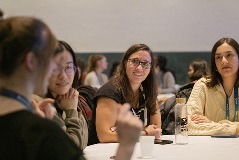
Student Opportunities at MRS Meetings
MRS Meetings offer opportunities for graduate students and post-docs to work as reporters, bloggers, or symposium assistants. These positions provide valuable networking and professional development with researchers from around the globe.
Privacy Policy |
Terms of Use
506 Keystone Drive, Warrendale, PA 15086-7537
Phone: 724.779.3003 | Fax: 724.779.8313 | Email: info@mrs.org
© Materials Research Society. All Rights Reserved.
Web Design & Development by Matrix Group International, Inc.
